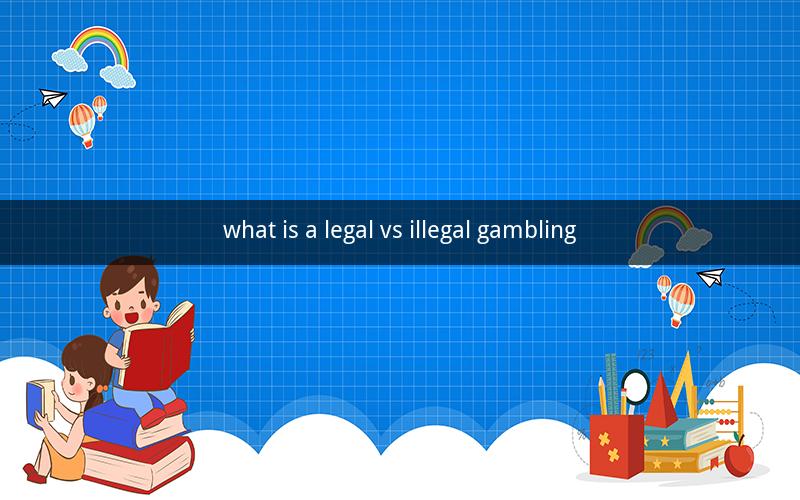
What is a Legal vs Illegal Gambling?
Table of Contents
1. Introduction
2. Understanding Legal Gambling
2.1 Definition and Types
2.2 Benefits of Legal Gambling
2.3 Regulations and Licensing
3. Illegal Gambling: An Overview
3.1 Definition and Types
3.2 Risks and Dangers
3.3 Enforcement and Penalties
4. Key Differences Between Legal and Illegal Gambling
4.1 Legality
4.2 Safety and Security
4.3 Regulations and Oversight
5. Conclusion
1. Introduction
Gambling has been a part of human culture for centuries, captivating people with its thrill and potential for financial gain. However, not all forms of gambling are legal in every jurisdiction. This article aims to explore the differences between legal and illegal gambling, highlighting the key aspects that distinguish them.
2. Understanding Legal Gambling
2.1 Definition and Types
Legal gambling refers to any form of gambling that is permitted by the laws of a particular jurisdiction. This can include casino games, sports betting, lottery, poker, and other gambling activities. Legal gambling is typically conducted by licensed operators who adhere to strict regulations to ensure fair play and protect consumers.
2.2 Benefits of Legal Gambling
Legal gambling offers several benefits, including:
- Safety and Security: Legal gambling operators are required to adhere to strict regulations and undergo regular audits to ensure fair play and security.
- Tax Revenue: Legal gambling generates significant tax revenue for governments, which can be used to fund public services and infrastructure.
- Consumer Protection: Legal gambling operators are required to provide a safe and fair environment for players, protecting them from fraud and other illegal activities.
- Regulation: Legal gambling is regulated by government authorities, which helps to prevent addiction and problem gambling.
2.3 Regulations and Licensing
To operate legally, gambling operators must obtain a license from the appropriate government authority. These licenses are subject to strict requirements, such as background checks, financial stability, and compliance with gambling regulations. The licensing process ensures that only reputable operators are allowed to conduct legal gambling activities.
3. Illegal Gambling: An Overview
3.1 Definition and Types
Illegal gambling refers to any form of gambling that is prohibited by the laws of a particular jurisdiction. This can include unlicensed casinos, underground poker games, and other unregulated gambling activities. Illegal gambling is often associated with organized crime and can pose significant risks to players and society.
3.2 Risks and Dangers
Illegal gambling carries several risks and dangers, including:
- Fraud and Scams: Illegal gambling operators are not subject to the same regulations as legal operators, increasing the risk of fraud and scams.
- Addiction: Illegal gambling can contribute to problem gambling and addiction, as players may not have access to the resources and support they need.
- Crime: Illegal gambling is often associated with organized crime, leading to increased violence and other criminal activities.
- Tax Revenue Loss: Illegal gambling reduces tax revenue for governments, which can impact public services and infrastructure.
3.3 Enforcement and Penalties
Enforcing illegal gambling laws is a challenging task for law enforcement agencies. Penalties for illegal gambling can vary depending on the jurisdiction, but may include fines, imprisonment, and other legal consequences.
4. Key Differences Between Legal and Illegal Gambling
4.1 Legality
The most significant difference between legal and illegal gambling is their legality. Legal gambling is conducted by licensed operators who adhere to the laws and regulations of the jurisdiction, while illegal gambling is prohibited and often associated with criminal activities.
4.2 Safety and Security
Legal gambling operators are required to provide a safe and secure environment for players, ensuring fair play and protecting them from fraud and scams. In contrast, illegal gambling operators may not prioritize safety and security, putting players at risk.
4.3 Regulations and Oversight
Legal gambling is regulated by government authorities, ensuring that operators comply with the necessary requirements to protect players and prevent addiction. Illegal gambling lacks this oversight, making it difficult to ensure fair play and player protection.
5. Conclusion
Legal and illegal gambling represent two distinct worlds, each with its own set of risks and benefits. While legal gambling offers safety, security, and regulation, illegal gambling poses significant risks and dangers. It is essential for individuals to understand the differences between the two and choose legal gambling options to protect themselves and their communities.
FAQs
1. What is the main difference between legal and illegal gambling?
- The main difference is that legal gambling is permitted by the laws of a jurisdiction, while illegal gambling is prohibited.
2. Can I play online poker if it is legal in my country?
- Yes, if online poker is legal in your country, you can play it through licensed online gambling operators.
3. How can I tell if a gambling operator is licensed?
- You can check if a gambling operator is licensed by visiting their website or contacting their customer support.
4. What are the benefits of legal gambling?
- Legal gambling offers safety, security, tax revenue, and consumer protection.
5. What risks are associated with illegal gambling?
- Illegal gambling carries risks such as fraud, addiction, crime, and tax revenue loss.
6. Can I be arrested for playing illegal gambling?
- Yes, you can be arrested for participating in illegal gambling activities.
7. Are there any legal implications for online gambling?
- The legal implications depend on the laws of your jurisdiction. Always check the local regulations before engaging in online gambling.
8. How can I protect myself from illegal gambling?
- You can protect yourself from illegal gambling by only engaging in legal gambling activities through licensed operators.
9. Can legal gambling lead to addiction?
- Yes, legal gambling can lead to addiction, just like any other form of gambling.
10. What should I do if I suspect illegal gambling?
- Report any suspected illegal gambling activities to the appropriate law enforcement agency.